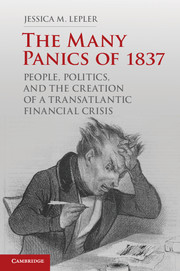Book contents
- Frontmatter
- Contents
- List of Figures
- Acknowledgments
- Abbreviations
- Atlantic Ocean
- Introduction The Many Panics of 1837
- Chapter 1 A Very “Gamblous” Affair
- Chapter 2 The Pressure of 1836
- Chapter 3 Practical Economists
- Chapter 4 Mysterious Whispers
- Chapter 5 The Many Panics in 1837
- Chapter 6 Parallel Crises
- Chapter 7 States of Suspense
- Epilogue Panic-less Panics of 1837
- Notes
- Index
Chapter 2 - The Pressure of 1836
Published online by Cambridge University Press: 05 June 2014
- Frontmatter
- Contents
- List of Figures
- Acknowledgments
- Abbreviations
- Atlantic Ocean
- Introduction The Many Panics of 1837
- Chapter 1 A Very “Gamblous” Affair
- Chapter 2 The Pressure of 1836
- Chapter 3 Practical Economists
- Chapter 4 Mysterious Whispers
- Chapter 5 The Many Panics in 1837
- Chapter 6 Parallel Crises
- Chapter 7 States of Suspense
- Epilogue Panic-less Panics of 1837
- Notes
- Index
Summary
Some stories start with a crash. Others, like this one, end with one. Instead of a crash, this story starts with the gentle landing of a very tired pigeon.
Rumor has it that on August 2, 1836, a pigeon landed south of London. Although few birds play significant roles in history, this particular pigeon, whose existence has never been irrefutably confirmed but whose legend endures, carried a note under its wing that was quite valuable to those who could interpret it. With three short words, “il est mort,” the message on the thin scrap of paper set off “the variations of all stocks & their wild fluctuations,” according to a prominent financier. Within six months, markets in the United States and Great Britain faced a financial crisis that would ultimately lead to a global economic depression, the worst of many in the nineteenth century.
Was the pigeon a portent? Many Londoners seemed to think so. The little bird’s cargo, the message “he is dead,” dashed their hopes that the world’s most skillful financial interpreter, Nathan Mayer Rothschild, would return to the City. Over the previous three decades, Rothschild had become the world’s wealthiest man by profitably interpreting the latest intelligence. While he attended his son’s wedding in Hamburg, news from across the Atlantic had created a “pressure,” what one political economist defined as “a difficulty of borrowing money and the necessity of paying a high price for it.” The pigeon’s note intensified the tight credit market because it confirmed that the bankers in London were left with only their own gloomy predictions of what the news from the American bank war would mean for their own battle-worn financial system. Without Rothschild’s potentially positive reinterpretation, no semiotic rescue would avoid the financial crisis many Londoners predicted.
- Type
- Chapter
- Information
- The Many Panics of 1837People, Politics, and the Creation of a Transatlantic Financial Crisis, pp. 43 - 66Publisher: Cambridge University PressPrint publication year: 2013



